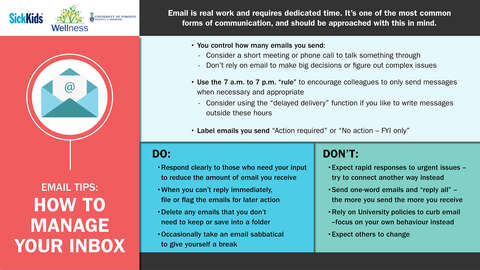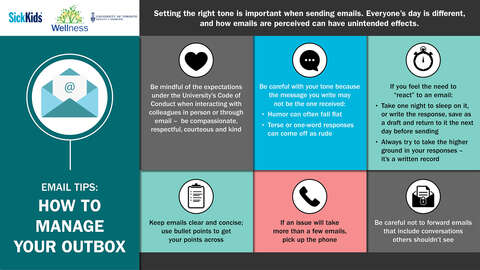Breadcrumbs
- Home
- Equity & Wellness
- Wellness
- Wellness resources
Wellness resources
Here we will post resources that may be useful to you in managing your wellness.
If you have resources to add, please email lmp.communications@uotoronto.ca.
Identify, Assist and Refer
Wellness tips and best practices
The Division of People Strategy, Equity & Culture have published new guides for employees, and for leadership:
- Wellness Tips and Best Practices For All Team Members (PDF)
- Wellness Tips and Best Practices For Managers, Deans, Chairs, and Directors (PDF)
Responding to physician suicide – building a culture of support and healing
Dr. Gino Somers, Co-Vice Chair Wellness, Inclusion, Diversity and Equity (WIDE) in LMP shares his experience adapting the “AMA STEPS Forward® After a Physician Suicide Toolkit” to meet the unique needs at SickKids. He discusses the challenges of addressing physician suicide, the importance of creating a supportive culture of wellness and how institutions can take meaningful steps toward healing and prevention.
Email management
Created by 'CopeWELL', the wellness group at SickKids.
How to manage your inbox

Download the PDF: wellness_resoources_how_to_manage_your_inbox.pdf
Email is real work and requires dedicated time. It’s one of the most common forms of communication, and should be approached with this in mind.
You control how many emails you send:
- Consider a short meeting or phone call to talk something through
- Don’t rely on email to make big decisions or figure out complex issues
Use the 7 a.m. to 7 p.m. “rule” to encourage colleagues to only send messages when necessary and appropriate
- Consider using the “delayed delivery” function if you like to write messages outside these hours
Label emails you send “Action required” or “No action – FYI only”
Do
- Respond clearly to those who need your input to reduce the amount of email you receive
- When you can’t reply immediately, file or flag the emails for later action
- Delete any emails that you don’t need to keep or save into a folder
- Occasionally take an email sabbatical to give yourself a break
Don't
- Expect rapid responses to urgent issues – try to connect another way instead
- Send one-word emails and “reply all” – the more you send the more you receive
- Rely on University policies to curb email –focus on your own behaviour instead
- Expect others to change
How to manage your outbox

Download the PDF: wellness_resources_how_to_manage_your_outbox.pdf
Setting the right tone is important when sending emails. Everyone’s day is different, and how emails are perceived can have unintended effects.
Be mindful of the expectations under the University's Code of Conduct when interacting with colleagues in person or through email – be compassionate, respectful, courteous and kind
Be careful with your tone because the message you write may not be the one received:
- Humor can often fall flat
- Terse or one-word responses can come off as rude
If you feel the need to “react” to an email:
- Take one night to sleep on it, or write the response, save as a draft and return to it the next day before sending
- Always try to take the higher ground in your responses – it’s a written record
Keep emails clear and concise; use bullet points to get your points across
If an issue will take more than a few emails, pick up the phone
Be careful not to forward emails that include conversations others shouldn’t see
